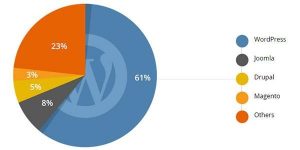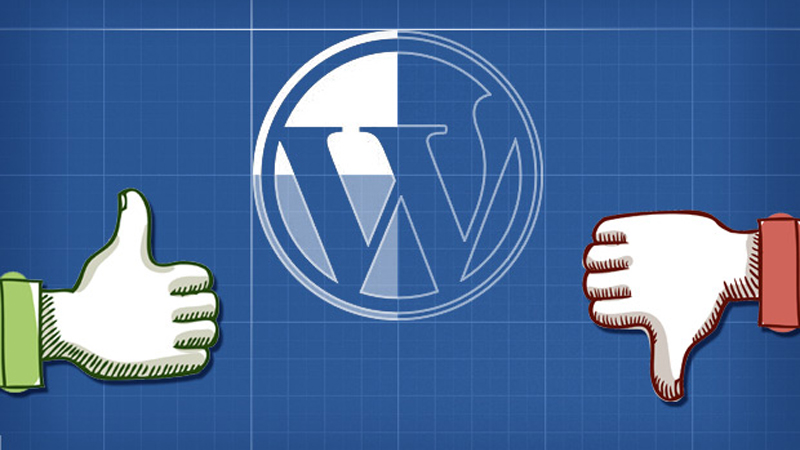If you own a company, then you need a website to be able to stand up to the competitive market and expand your business. But the question that comes to mind is where to begin? What framework is best to get the development started with? Even if you’ve got a website, then you should know how to stay at the top. Either way, you need to consider having a website that will accelerate your growth and make sure it isn’t outdated.
Having a content management system website is easier and more efficient, as it allows you to easily and effectively modify the content. We provide an abstract level so users can easily construct generic features and achieve your business objective.
Let’s have a look at some of the facts of WordPress:

- 75 million sites depend on it
- WordPress almost powers 23% of the entire websites
- There are 37 million searches for keywords per month.
- There are more than 45,000 plugins

In this article, we will be discussing the advantages and disadvantages of WordPress.
The advantages of WordPress:
Open source:
WordPress is an open source platform meaning developers can use the code already written and used without having to change or start from the start, isn’t it great? Therefore, as it has broad developer groups, developers share codes with each other saving time and cost to write and implement a new one. It comes under the GPLv2 license that means, you can easily modify, distribute and use the code without having to pay any subscription or license fees.
Usability and simplicity:
You need to have a basic understanding of technical jargon and familiarity with other systems or CMS, but when it comes to WordPress users with no technical background and use it quickly, too. You don’t have to be familiar with programming languages such as HTML, PHP, CSS etc as you select and use them. WordPress can be easily set up, revised, and managed.
Easy to operation:
All changes with time or just to abide by the new technology and rules you need to incorporate a little change in your web, whether it’s removing / adding a tab, changing the background colour, themes etc. Now, what? You’re going to outsource the project or employ designers or developers to alter it, but you don’t have to hire anyone with WordPress who doesn’t need technical assistance as you can make changes to the platform without writing a single line of code. It saves you time and resources, as there is no need for a high-level developer / designer to set up it.
Plugins:
Another great advantage of WordPress. It has over 45,000 plugins for almost every functionality. You want to run an analysis of your site; you have a specific plugin want to enhance the SEO you’ve got another one. Again, you don’t have to write a single line of code for any functionality just install the respective plugin and have that functionality in your site.
Rapid development:
WordPress’s biggest advantage is the speed at which you can build and start using a website. With the support of APIs, you can build frameworks, apps and platform in full. The process of developing a site is especially straightforward in drag and drop functionality which makes it much easier to create websites.
The Disadvantages of WordPress:
Open source:
What could be the blessing is the curse itself example WordPress is famous because it is an open source, and this is the same reason for its downfall. As it is widely used, it is always at the target of hackers. Your site is vulnerable to cyber-attacks as the code you use has been written by someone else, therefore, the possibility could be that it might contain some malicious code or bug to hinder the functionality of the site.
The Speed of the site:
WordPress pages have loads of generic codes and plugins to integrate features into the web, enabling the site to respond gradually, reducing the loading time. When users find the platform is not reacting well and takes time, they will consider going for the other alternatives. It is always good to consider using a high-performance hosting to avoid potential problems like this.
Excess of plugins:
there are plugins to improve the site’s features, but they could also work the other way around. Having loads of plugins would affect the site’s output dramatically making it slower and reducing the response time. Try to refrain from using plugins and uninstall those that no longer work or are no longer needed with each update.
Frequent updates:
Frequently updating your site might hamper its functionality. Updates make the sites more enhanced. After each update some functionality of the site doesn’t work for example plugins might stop working and you need to remove the old ones with new ones. Also, before updating the site make sure that you have a backup of your site in case, when the update is not successful you could restore to the previous version easily.
MySQL as Database backend:
WordPress uses MySQL as a backup to the website that is less safe and therefore vulnerable to cyber-attacks and can be easily hacked. The private and important data had been stored on MYSQL driver until the 3.9 version but now it is using MySQL.
Suboptimal for SEO:
SEO lets you stay at the top of your site and make it accessible to users. You don’t have to code or rely on developers or outsource it to external help just install the respective plugin and boost your site’s performance.
Lastly, although WordPress has both advantages and disadvantages, it can still be used, and its advantages outweigh its disadvantages. For WordPress, it’s entirely possible to combine various structures and increase the company development and achieve the desired goal.



